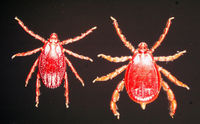Difference between revisions of "Rhipicephalus appendiculatus"
From Pestinfo-Wiki
| (4 intermediate revisions by the same user not shown) | |||
| Line 1: | Line 1: | ||
| − | {{ | + | {{TaxLinks|LnkRhipicephalus}} |
| − | {{ | + | {{LiteratureDBX|{{PAGENAME}}|2404|browse,Ccountrylnk,Xcrops,AbenefialsN}} |
| − | [[File:Rhipicephalus-appendiculatus-life-cycle.jpg| | + | [[File:Rhipicephalus-appendiculatus-life-cycle.jpg|300px|thumb|''Rhipicephalus appendiculatus'' life cycle (click on image to enlarge it)<br/>Author(s): Alan R. Walker<br/>Source: [http://commons.wikimedia.org/wiki/File:Rhipicephalus-appendiculatus-life-cycle.jpg Wikimedia Commons]]] |
| − | <font color="#800000">'''''Rhipicephalus appendiculatus'''''</font> Neumann - African brown ear tick | + | <font color="#800000">'''''Rhipicephalus appendiculatus'''''</font> Neumann, 1901 - (African brown ear tick) |
| − | infests livestock in Africa and transmits ''Theileria parva'', the causative agent of East Coast fever. It | + | |
| + | The tick infests livestock in Africa and transmits the protozoan, ''Theileria parva'', the causative agent of East Coast fever. This is the most important, tick-borne disease agent of cattle in sub-Saharan Africa and results in high rates of mortality and morbidity. | ||
| + | |||
| + | The tick is widely distributed in Africa and the Near East and common in eastern Africa. It has a three-host life cycle and adults mainly infests the ears of cattle and buffalo. Immature stages are found on smaller mammals. They feed on their hosts for a few days then drop to the ground and continue their development. | ||
| + | |||
<gallery widths=200px caption="Other images of Rhipicephalus appendiculatus (Wikimedia Commons - click to enlarge)"> | <gallery widths=200px caption="Other images of Rhipicephalus appendiculatus (Wikimedia Commons - click to enlarge)"> | ||
Latest revision as of 21:12, 16 August 2022
| Literature database |
|---|
| 97 articles sorted by: |
| • year (descending) |
| • research topics |
| • countries/regions |
| • list of natural enemies |

Rhipicephalus appendiculatus life cycle (click on image to enlarge it)
Author(s): Alan R. Walker
Source: Wikimedia Commons
Author(s): Alan R. Walker
Source: Wikimedia Commons
Rhipicephalus appendiculatus Neumann, 1901 - (African brown ear tick)
The tick infests livestock in Africa and transmits the protozoan, Theileria parva, the causative agent of East Coast fever. This is the most important, tick-borne disease agent of cattle in sub-Saharan Africa and results in high rates of mortality and morbidity.
The tick is widely distributed in Africa and the Near East and common in eastern Africa. It has a three-host life cycle and adults mainly infests the ears of cattle and buffalo. Immature stages are found on smaller mammals. They feed on their hosts for a few days then drop to the ground and continue their development.
- Other images of Rhipicephalus appendiculatus (Wikimedia Commons - click to enlarge)

